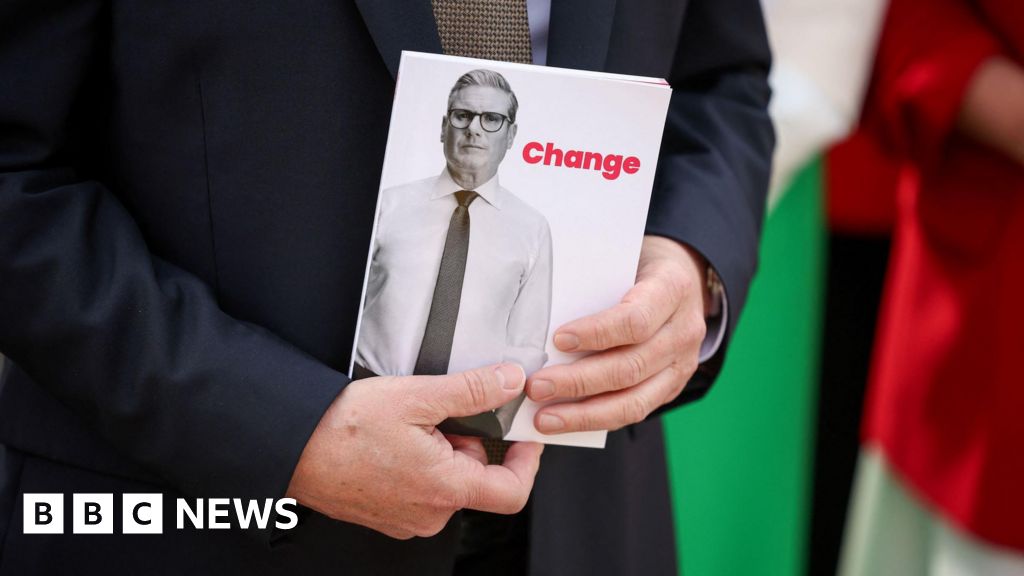World
Labour vows to ‘reset’ relations between Scotland and UK – BBC News

- Author, Craig Williams
- Role, BBC Scotland News
-
Labour has promised to change the way Westminster and Holyrood co-operate as part of a wide-ranging set of constitutional reforms.
The party’s UK manifesto – which was launched in Manchester on Thursday – includes plans to set up a new Council of the Nations and Regions to bring together the prime minister and the leaders of the devolved nations and regions.
It will also “strengthen” the Sewel convention, which helps decide who legislates on devolved and reserved policies between the UK’s parliaments and assemblies.
Labour said the changes would deliver “better results for the Scottish people”.
The manifesto commits Labour to:
- Strengthening the Sewel convention with a new “memorandum of understanding” which will describe how the UK and Scottish governments will work together.
- Establishing a new Council of the Nations and Regions which will bring together the prime minister, the first ministers of Scotland and Wales, the first and deputy first minister of Northern Ireland, and regional mayors.
- Supporting the Scottish government to partner with international bodies where relevant and appropriate.
- Ensuring members of the Scottish Parliament have the same free speech protections at Holyrood as MPs enjoy at Westminster, so that whether in Westminster or Holyrood, parliamentarians can hold power to account.
- Reforming the House of Lords by immediately ending hereditary peers and planning for a “representative” second chamber.
Labour’s Ian Murray said Scots have been represented for too long by “two governments more interested in fighting each other than fighting for them”.
“That needs to end. The next UK Labour government will reset the relationship between the UK and Scottish governments with new ways of working,” he said.
“If we prioritise co-operation over conflict, we can deliver better results for the Scottish people.”
Mr Murray said this would require the governments in Westminster and Holyrood to recognise and respect one another’s roles.
“A UK Labour government with Scottish Labour MPs at its heart will look to deliver for the change Scotland needs, and we’ll work with the Scottish government to do so,” he said.
‘Change the attitude at Holyrood’
Responding to the manifesto plans, SNP leader John Swinney said: “I’ll happily work with an incoming Labour government for the betterment of Scotland. That’s my duty as first minister.
“But there are much wider choices available to the public in this election. Because what will concern me deeply is the prolonging of austerity, which is what the Labour government is proposing.”
The Scottish Conservative’s deputy leader, Meghan Gallacher, said the plans showed Labour’s priorities.
“But for me and the Scottish Conservatives, we are certainly looking for the Scottish government to use the powers they have got so far,” she said.
Christine Jardine of the Scottish Liberal Democrats said that she agreed the relationship between Holyrood and Westminster needed to be reset as relations have been bad over the past five years.
She said: “But you’re not going to change that just by changing the government at Westminster.
“You have to change the attitude at Holyrood as well.”
Elsewhere on the campaign trail the SNP unveiled their latest poster campaign, entitled “Leading for Scotland, not led by Westminster”.
The Scottish Conservatives announced their backing for a campaign by the private nursery sector to end what they called the “disparity” of funding through the Scottish government’s provision of 1,140 hours of free childcare per year.
The Scottish Liberal Democrats announced plans to make renewable energy installations benefit their local communities.
The party’s Christine Jardine said large energy suppliers would be made to sell the power generated by wind farms directly to customers nearby, with money also going to community benefit funds.
And the Scottish Greens announced a manifesto pledge to make all of Scotland’s national football games free to watch.
Quite a few Labour policies – such as reforming the Sewel convention – aren’t exactly what voters are demanding.
But party insiders think the relationship between the Scottish and UK governments has reached a new low. One told me they feared devolution had become a form of “political warfare.”
Scottish Labour hopes that reforms like this can ultimately lead to more effective government that delivers for Scots.
There are other aspects of the Labour manifesto that are squarely aimed at appealing to voters.
We can expect Anas Sarwar to reel off pledges in the weeks ahead about higher wages, a public-sector energy company based in Scotland and extra funding for Scotland.
But we’ll also hear the SNP raise concerns about spending under a UK Labour government.
The respected Institute for Fiscal Studies (IFS) think tank calculates there will have to be around £18bn of cuts to unprotected UK departments. Though they do estimate that total UK public spending will increase above inflation.
Scottish Labour insists there are no plans to return to austerity but we can expect this particular dispute to rumble on.

